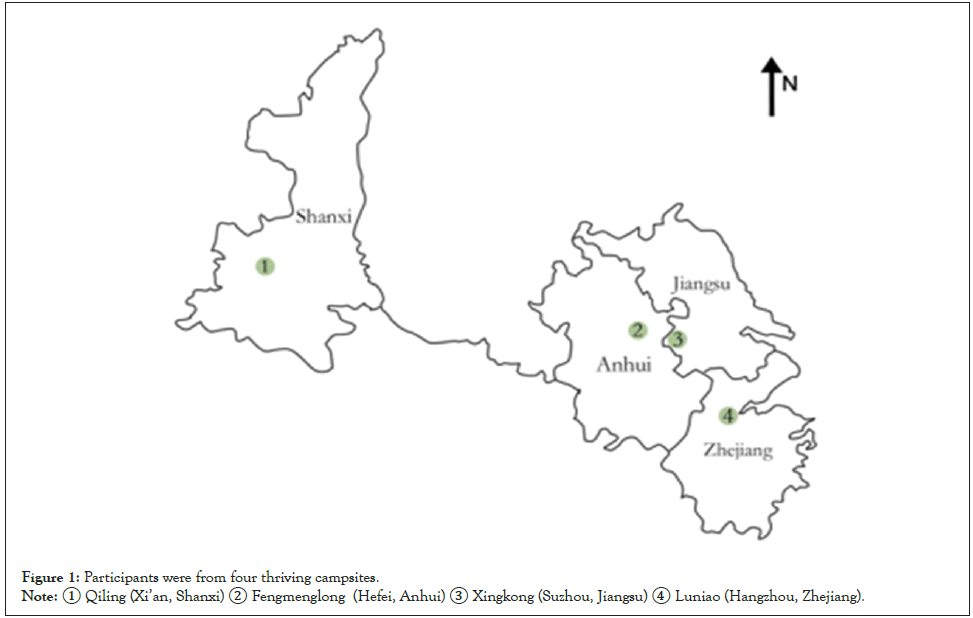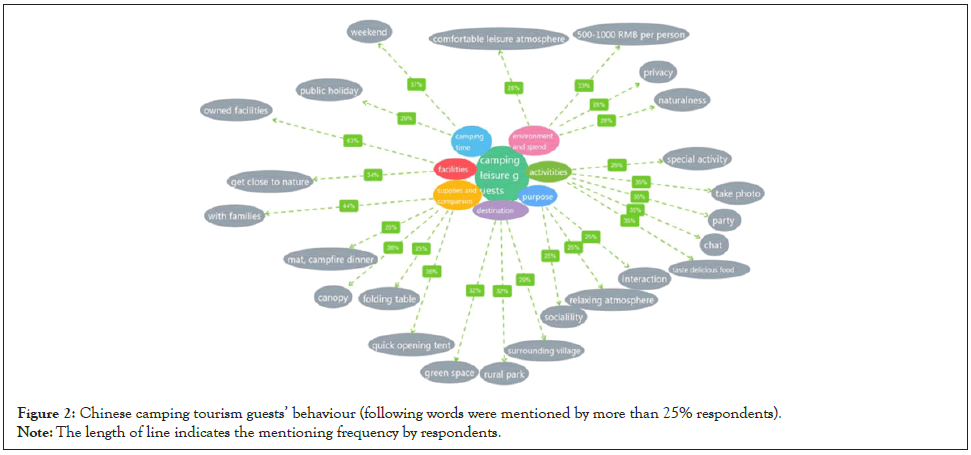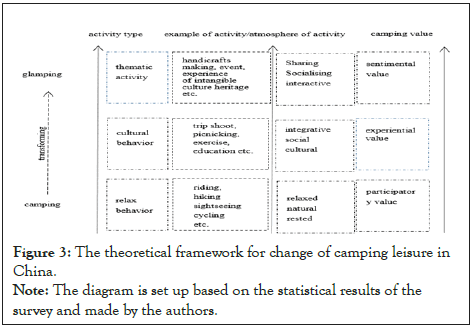Journal of Tourism & Hospitality
Open Access
ISSN: 2167-0269
ISSN: 2167-0269
Research Article - (2023)Volume 12, Issue 6
Visitor inflows and green consumption are universally regarded as significant indicators of sustainable development at tourism destinations. However, given the calculation complexity of measuring critical changes in this field, there is a lack of empirical evidence demonstrating a dramatic change in the following two representative variables of camping leisure in China: Value pursuit and consumption preferences of glamping guests. In this study, a questionnaire and field survey were administered. We aim to discover the transformation trends of camping to glamping by analyzing campers’ product demands and consumption behavior. The results of this study show that the need for supply for camping leisure and tourism value perception is going toward leap-forward development. Overall, changes and trends in camping leisure provide new insights for assessing programs related to enterprise investments by focusing on the value transition from camping to glamping, which are important and substantial measurement indicators of destinations’ product and brand growth.
Campers’ demand; Camping leisure activity; Chinese camping; Glamping value
Leisure travelers who participate in camping are characterized by the pursuit of travelling in comfort while enjoying nature in a leisurely manner [1-3]. Camping is a nature-based tourism activity in which individuals spend one or more nights away from home outdoors. Camping has become a popular trend in China because of the COVID-19 outbreak since 2020 and the camping market has developed at an alarming rate (http://www.ccnee.com/). According to the sales of camping supplies by Decathlon retailers in the first quarter of 2022, the turnover of tents, mats, barbecue utensils, portable tables, chairs, beds and other commodities increased by more than 200% year-on-year in China. Starting from 2022, more and more people have been participating in camping tourism in China. The core market size of China's camping economy reached 74.75 billion yuan in 2021, up 62.5 percent year-on-year, and this size has reached 113.47 billion yuan in 2022 with a yearly increase of 51.8% according to research firm iiMedia Research. Based on this phenomenon, our project team conducted a series of investigations in the consumer field, and proposed a theoretical framework for changes in camping leisure in China. “Research Report on the Current Situation of China’s Camping Economy Industry and Consumption Behavior Data in 2021-2022” shows, 35.4% of camping consumers go camping once every 3-6 months (iimedia Research). Our study focuses on the development of campers’ leisure behavior and dives deeper into their pursuits. In this paper, we first outline the characteristics and benefits of camping. Second, we review the existing literature and introduce our research method. The researchers adopted a survey- based approach to understand campers' behavior and experience and collected camper cost data to detect the characteristics of camping demands in 2022. Third, we analyze and conclude with the pursuits of camping tourists and offer insights related to leisure activities and the change in their sense of camping value from a demand perspective.
In China’s ever-changing tourism trend, there is a preference for alternative forms of leisure that deviate from traditional rural sightseeing events. Camping is a short-time outdoor travel lifestyle, and convenient and compact outdoor equipment is used to recreate it outdoors. This form of leisure is beneficial because it encourages close proximity to nature and campers perform their own recreational activities, and our research focuses on tent camping. Understanding trends in consumer demand and activities will help enterprises gain a competitive advantage in fiercely competitive markets.
Recently, interest in glamping (a lexical blend of ‘glamorous’ and ‘camping’) has been rapidly increasing [4], which offers outdoor lovers an ‘outdoor hotel’ experience by removing the discomforts associated with outdoor experiences [3,5]. The popularity of camping tourism in China has been continuously increasing, the market size has grown rapidly, and the personalized demand for tourists has become increasingly strong with main motivation of campers having close contact with nature, avoid crowds and punch in [6]. Consumers who are passionate about camping tend to prefer group travelling, short distance, and multi-element integration (http://www.ccnee.com/). Camping can fulfill people’s desire to get close to and return to nature, so suburban camping tourism has become a priority choice for replacing other forms of tourism in China [7]. Scholars have built dependent variables and models to explore the behavior of campers following the COVID-19 pandemic. They have previously reported that the camping tourism experience is more likely to influence leisure travelers’ behavior in choosing tent camping or glamping [8]. Experience is a crucial concept in the social psychology of leisure [9,10] and it is a driver of campers between different kinds of behaviors in the tourism context [11]. As there is scarce research on Chinese camping that combines the consumption and experience of campers, a qualitative approach is desirable to better understand the transformation phenomenon [12]. Moreover, qualitative research is particularly crucial for studying how campers enjoy their time, capturing their mental pursuits, and their perceptions of camping value. The survey was conducted with the design of a structured questionnaire and interview. Respondents were provided printed questionnaire and it contained the following two parts: Demographic information, consumption information, and preferences. The demographic part consists of the background of the respondent, which includes gender, age, and education (Supplementary Figures 1 and 2).
For the second part, the questionnaire included items to understand camping activity, perception of value, and source of information when they were camping. Questions were designed such as “When is your favorite time for camping”, “What is your main purpose for camping”, these expressions in this questionnaire were rooted in existing researches [8]. Open-end question investigation measuring actual feelings is needed in the study of the consumption-emotion gap in camping leisure, which has mostly been employed in in- depth interviews [13-15]. Therefore, the interview section involving the camper’s past experience was adjusted to our topics when necessary, and the interviews were conducted as an open interview that ranged questions from normal to detailed open-ended questions were adopted to encourage telling their real feelings to discover and understand the meaning of the camper's thoughts and sensations [16].
The study method of interview section was based on a qualitative discourse analysis that aimed to build a particular experience topic in a specific campsite context. Respondents were provided enough time to depict their past experiences with camping, and their answers to the open interview section were recorded on a smartphone and transcribed/converted into words/text after the completion of the interviews to obtain a real description of their experience [17]. This kind of method has the potential for interviewers to conduct the survey at the campsites, as it was crucial to observe campers in their own camping in order to understand their behavior and experiences. This methodological approach allows Chinese glamping to be studied through a very close conversation with participants. Discourse analysis was performed using ROST Content Mining System Version 6.0 (ROST CM6). This type of content analysis software is based on a research method “measuring the amount of specific content in all samplings” [18]. In consideration of the competitive advantages of outstanding campsites and their word of mouth [11], participants were from four thriving campsites Qiling, Fengmenglong, Xingkong, and Luniao in four different cities: Xi’an, Hefei, Suzhou, Hangzhou (Figure 1).

Figure 1: Participants were from four thriving campsites.
Note: ① Qiling (Xi’an, Shanxi) ② Fengmenglong (Hefei, Anhui) ③ Xingkong (Suzhou, Jiangsu) ④ Luniao (Hangzhou, Zhejiang).
The survey was completed on 25th-27th Apr.2022 and 1st-5th Oct.2022, under the following weather conditions on the days of the survey: Sunny with comfortable temperature. Finally, 412 campers (Males and females were nearly equally represented at 53% and 47%, see Table 1) were invited to answer the questionnaire, all of them had visited one of campsites of the area mentioned above. A total of 400 valid questionnaires were received, comprising the entire dataset for this study with 92.5% of efficiency (Table 1).
| Socio-demographic indicators | Percentage |
|---|---|
| Gender | |
| men | 53% |
| women | 47% |
| Age group | |
| younger than 39 | 65% |
| 40-50 years | 26% |
| 51 years and older | 9% |
| Level of formal education | |
| below high school | 13% |
| high school or technical degree | 47% |
| College or higher | 40% |
Note: (n=400)
Table 1: Socio-demographics of respondents.
And 200 of them were interviewed, they were mainly asked how they perceived the camping activities. In this section, questions for respondents asked by interviewers include: “What do you really want from your camping?”. “Could you please describe your past camping experience?” (Supplementary Table 1).
Finally, 4000 useful data were included in the questionnaires analysis, most of respondents showed a great preference for outstanding service and activities of campsites, more specifically, 35% of campers said they came camping with friends, while 28% of participants indicated that they value the sociability, privacy, and cultural experience of camping very much (Figure 2).
Currently, the main force of camping tourism is young people due to the popularization of camping. Ms. Li (a camper from Hangzhou, 30 years old) said: “Inviting a few good friends to go camping, taking some good photos and sharing them on the Internet while talking and taking part in activity together are a new way of enjoying life.” Additionally, nuclear families (44%) were the main consumers [19] (Table 2).
| Questions | Choices1 | % | |
|---|---|---|---|
| Glampers’ favorite camping time | Weekdays | 6% | - |
| Festival | 24% | ||
| Weekend | 37% | ||
| Public holiday | 29% | ||
| Annual leave | 4% | ||
| Travelers’ camping distance | City park | 22% | - |
| Urban suburbs | 22% | ||
| Surrounding villages | 29% | ||
| Remote village | 16% | ||
| Outside the province | 11% | ||
| Main glamping leisure equipment of gampers | Storm-suit | 4% | 49% |
| Portable backpack, folding stool, four seasons, sleeping bag | 11% | ||
| Canopy, quick opening tent | 36% | ||
| Light coats, retro lantern, handmade coffee pot, carpet | 24% | ||
| Mats, folding table, campfire dinner, hiking shoes | 25% | ||
| Glampers’ costs on a single camping leisure Renminbi (RMB) | 100-300 | 13% | 23% |
| 301-500 | 31% | ||
| 501-1000 | 33% | ||
| 1001-2000 | 19% | ||
| 2001+ | 4% | ||
| Glampers’ main purpose | Experience what is on the season | 17% | 38% |
| Get close to nature leisure | 34% | ||
| Comfortable environment | 21% | ||
| Social interaction | 17% | ||
| Immersive and relaxing lifestyle | 11% | ||
| Glampers’ favorite leisure activities | Reading, walking, exercising | 15% | 47% |
| Internet surfing and playing electronic products | 16% | ||
| Chat, party, take photos, taste delicious food | 22% | ||
| Fishing, bonfire, barbecue, entertainment etc. | 28% | ||
| Special glamping activities (e.g. music festival, lawn tennis) | 19% | ||
| Campers’ preferred camping destination | Rural park and green space | 32% | - |
| Mountains and hills | 17% | ||
| Desert | 13% | ||
| Grassland and forest | 18% | ||
| Sea and beach | 20% | ||
Note: 1Each question has five choices and respondents need to choose the most suitable one for their own situation.
Table 2: Questionnaire statistics of camping leisure respondents.
From the responses of questionnaires, finds that 20% tourists prefer seaside and beach camping Table 2, and either bring their own camping equipment or buy some high-end camping equipment at the camp. Meanwhile, we noticed drastic changes in demand for camping services, higher quality supplies, various tourism activities, and scenario consumption during the campers’ stay. In terms of basic supplies for glamping tourists, the most purchased items include canopies, carpets, hand-drip coffee makers, campfire dinners, and retro-style lanterns column 3 of Table 2. Non-overnight camping guests usually choose crucial sets such as single-camping tickets, simplistic tents, picnics, and parent-child parks. Overnight camping guests value the immersive, experiential, and interactive features of camping tourism, pay more attention to scene services, and are willing to spend more. In terms of motives, glamping leisure focuses on being close to nature and on communicating. In the process of popularizing camping leisure, camping groups of various styles have begun to pay more attention to the leisure atmosphere, social interaction, and comfort of travel column 5 of Table 2. The natural features of the camping destinations, the environment of artificial greenery and nature, and the comfort of the owned or purchased equipment meet the campers’ needs for environmental atmosphere, privacy, and natural comfort.

Figure 2: Chinese camping tourism guests’ behaviour (following words were mentioned by more than 25% respondents).
Note: The length of line indicates the mentioning frequency by respondents.
For the answers to the interview section, after text conversion, word segmentation by the software Rapid Optical Screen Tool (ROST) CM6, high-frequency word statistics, keyword extraction, and semantic network analysis, the key words were axially coded, and analysis was conducted on the pursuits of campers. In this process, it was found that in classical camping tourism, campers simply visit, including activities related to sightseeing, such as cycling and hiking; at this stage, the campers’ interpersonal interaction was not deep enough. For example, “Camping operators should put in effort on the supply side, explore new campsites and products deeply and develop more 'interesting' scenes such as lakesides, forest parks, and grand canyons, and set up more thematic activities with cultural elements such as ball games, trip shoot, events etc. to enhance camper's sense of culture” Qiyan Wang said. When campers began to integrate themselves into local cultural tourism activities to optimize their experiences, they began to transition to glamping. This shows that glamping activities with deep cultural connotation are more attractive, which is a distinctive feature of sustainable development of camping activities. Upon reaching the glamping stage, campers begin to participate in scenario and innovative consumption activities, which are characterized by the sublimation of personal experience and emotional values. This finding could indicate that shifting with behavior does appreciate the experience as much as participants who think the scenario consumption is for people like them, although both selves reported dissimilar emotional processes. This finding shows that the change from campers to glampers and cultural experiences is a strong impetus for the transformation of camping into glamping in the tourism context (Figure 3).

Figure 3: The theoretical framework for change of camping leisure in
China.
Note: The diagram is set up based on the statistical results of the
survey and made by the authors.
Our study focuses on camping leisure activities from the perspective of campers. It can contribute to expanding the conceptual knowledge of camping leisure and provide avenues for future research. The findings on the characteristics of the camping-to-glamping transformation have theoretical implications. Furthermore, this study investigates campers' actual behavior, participation consciousness, and sentimental value, rather than their ideals. This is in line with the findings [5], who revealed that service quality and consumers’ perceptions of services are receiving increasing attention, and camping activities are designed to meet guests’ needs. Interestingly, the findings of this study also demonstrate that 38% campers perceive camping as an even more social, immersive and cultural experience travelling way. These findings indicate that when people have a high degree of perception of camping culture that is oriented toward participation, interaction, and sociability, 47% campers become aware of the values of camping leisure, tend to participate in thematic activities, recognize the benefits of camping leisure, and perceive the importance of activity innovation. Chinese glamping is an essential development phenomenon that cannot be ignored, this indicates that the Chinese camping market will undergo in-depth exploration and development, enabling quality-improvement of service needs.
In summary, judging from the current characteristics and future trends of China's consumer market development, this trend is inseparable from the rapid development and contribution of the camping economy. Based on the overall tendency and data analysis, we conclude that the development of glamping leisure focuses more on pursuing camping value. The responses of our research can be used to assess the activities and designs for both camping product forms and local campsites. This research also provides campsite managers with practical implications, for a period of time in the future, supply-side enterprises will have great potential in camp development, product design, event creativity, and equipment and supplies sales. At the same time, the changes in the way of camping tourism will further make camping integrate sports, accommodation, education and other fields, indicating that the Chinese camping market will carry out in-depth exploration of the development path of diversified service needs, and the segmentation, quality and diversification of camping tourism supplies will also become the future development trend. The camping leisure culture of China will inevitably become a new research perspective.
1. Major Humanities and Social Research Province Zhejjiang (2023QN124); 2. Zhejiang Provincial Department of Culture and Tourism (2022KGY040).
Citation: Xu L, Li Q, Xu D (2023) Camping is Trending in China: What are the Pursuits of Campers?. J Tourism Hospit.12:538
Received: 19-Nov-2023, Manuscript No. JTH-23-28082; Editor assigned: 22-Nov-2023, Pre QC No. JTH-23-28082 (PQ); Reviewed: 06-Dec-2023, QC No. JTH-23-28082; Revised: 13-Dec-2023, Manuscript No. JTH-23-28082 (R); Published: 20-Dec-2023 , DOI: 10.35248/2167-0269.23.12.538.
Copyright: © 2023 Xu L, et al. This is an open-access article distributed under the terms of the Creative Commons Attribution License, which permits unrestricted use, distribution, and reproduction in any medium, provided the original author and source are credited.